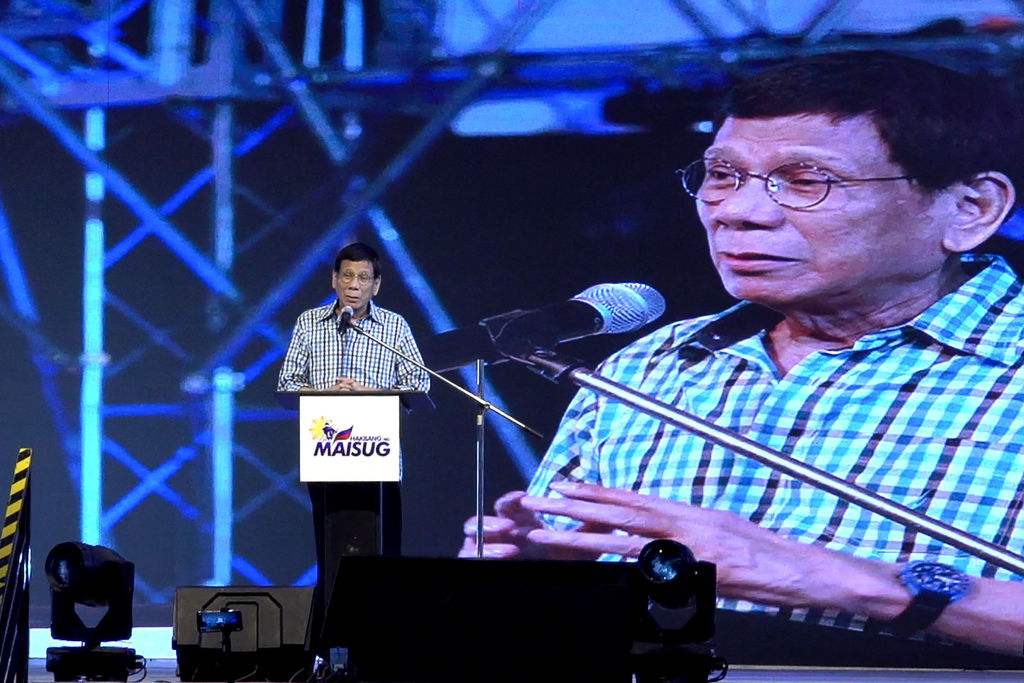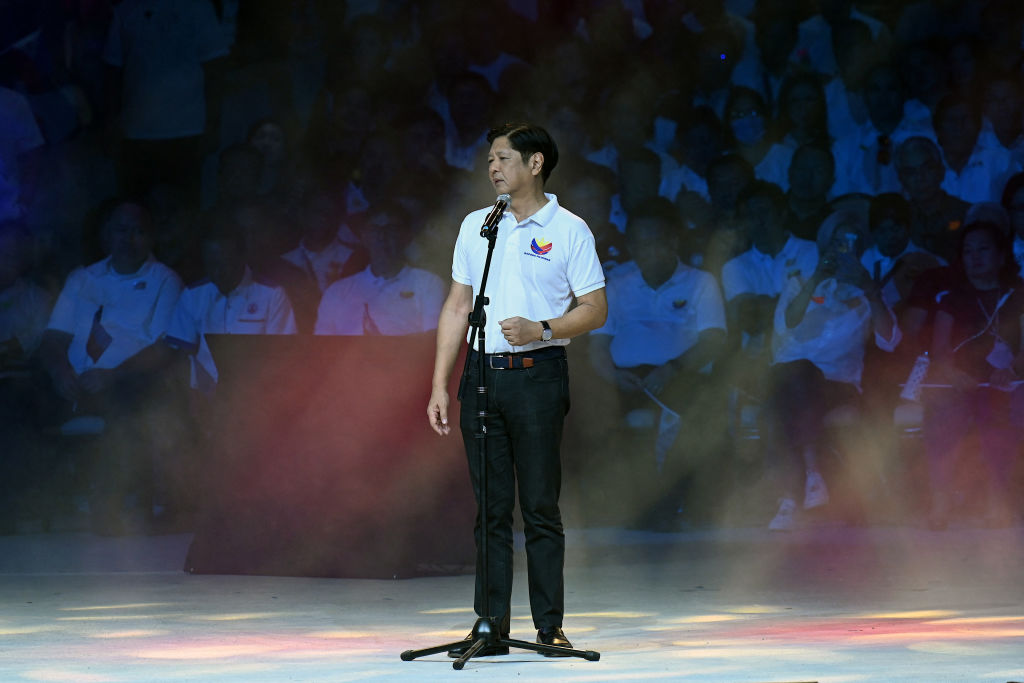
Philippine President Ferdinand “Bongbong” Marcos Jr. just laughed off allegations that he’s a user of illegal drugs—a charge recently leveled at him by his predecessor, Rodrigo Duterte.
“I think it’s the fentanyl,” Marcos, 66, told local reporters on Monday, turning the accusation back on Duterte. “After five, six years, it has to affect him; that’s why I think that’s how he turned out. So I hope his doctors take better care of him than this—and not neglecting when he’s having problems.” (Duterte once “joked” about abusing the infamous opioid.)
The 78-year-old Duterte, notorious for his expletive-laden rants, lashed out at Marcos, claiming he had seen Marcos’ name on a watchlist of suspected narcotics users back when Duterte was mayor of Davao City in the early 2000s, during a prayer rally on Sunday in Davao against Marcos’ plans to revise the Philippine constitution. “Bongbong Marcos was high back then. Now that he’s the President, he’s still high,” Duterte said. “We have a drug addict for a President!”
The Philippine drug enforcement agency denied on Monday that Marcos was ever on such a list, but that didn’t deter Duterte from digging in during another rally on Tuesday. “Fentanyl is prescribed by a doctor, it has prescription. After that, I got better … Now I’m asking you, does cocaine have prescription? Where do you get your supply?” he rhetorically questioned Marcos before threatening to lead a secession of the southern island of Mindanao, on which Davao City is located, should Marcos’ constitutional reform go ahead.
On Sunday, Marcos was at a rally in Manila championing a push by the House of Representatives, led by his cousin, to update the country’s constitution, which was introduced in 1987 after Marcos’ dictator father Ferdinand Marcos Sr. was ousted from power.
Marcos says the charter needs certain parts amended to facilitate greater economic growth, while Duterte is suspicious that the process will be exploited to remove term limits, which currently restrict Presidents to a single six-year term.

The latest exchange of barbs brings to the fore a long-rumored rift between the Southeast Asian nation’s most influential political families. The two had united in 2022 when Duterte’s daughter, Sara Duterte-Carpio, joined Marcos on a national ticket for President and Vice President that went on to win in a landslide victory. But as Duterte-Carpio eyes her own ascendance to the top job in 2028, and Marcos navigates the delicate politics of growing calls for Duterte to be held accountable for his deadly war on drugs, the clash also highlights how potent charges of drug abuse remain in Philippine politics.
It’s not the first time Duterte has levied accusations of drug-related criminal behavior against political enemies. Mayors have been killed—and Leila de Lima, a former senator and vocal Duterte critic was jailed for more than six years—for their supposed links to the narcotics trade.
De Lima tells TIME that former President Duterte found throwing drug-use accusations “a very effective way to shame his enemies and justify their elimination.” She added: “Once Duterte calls you an addict, better be careful.” Marcos, she said, “should not have stooped to his level.”
Read More: Leila de Lima Is Free but Not Finished Fighting: Exclusive Q&A With Duterte’s Fiercest Critic
Duterte never endorsed Marcos Jr.’s presidency and was reportedly disappointed his daughter Sara, who led presidential public opinion polling in the lead-up to the 2022 national elections, sought the second-highest position instead of the highest. But the new broadsides from the Dutertes—Rodrigo’s son Sebastian, the current mayor of Davao, also said on Sunday that Marcos was to blame for a rise in crime in the country and should resign; “you are lazy and lack compassion,” he charged—come as the Philippines under Marcos seems like it may change its tone towards the International Criminal Court, which has been shunned by the country since launching an investigation into Duterte’s drug war. Marcos Jr. and his officials had long echoed the Dutertes’ rhetoric that such a probe would encroach upon the country’s sovereignty and judicial system.
That alliance, however, has shown signs of fraying. In November last year, Marcos said his administration is studying whether or not to become a signatory again of the Rome Statute, the treaty that forms the ICC. By December, the country’s top lawyer said he “does not see any reason” why ICC investigators should be barred from entering the Philippines, provided they do not do anything illegal and have proper documents.
The issue over the ICC is just one of several flashpoints that have come between the Dutertes and Marcoses since 2022. Most recently, a Marcos-allied Congress questioned Vice President Duterte-Carpio’s request for some $11.5 million of confidential funds for the vice presidential office and education department, which she also leads, forcing her to withdraw the bid.
“One would hope that this rift, this seeming break between the two camps might just result in the Marcos administration taking accountability for abuses during the Duterte regime more seriously,” Carlos Conde, senior researcher at the Asia division of Human Rights Watch, tells TIME, before throwing cold water on the notion. “But there’s no indication of any of that and I doubt there will ever be. All this, of course, is just politics and I think it is a mistake to even entertain the notion that the fighting would necessarily move President Marcos to suddenly go after Duterte for ‘drug war’ crimes.” Marcos’ own administration, Conde says, has overseen draconian anti-drug operations continue, with over 500 killed so far.
More Must-Reads From TIME
- The 100 Most Influential People of 2024
- Coco Gauff Is Playing for Herself Now
- Scenes From Pro-Palestinian Encampments Across U.S. Universities
- 6 Compliments That Land Every Time
- If You're Dating Right Now , You're Brave: Column
- The AI That Could Heal a Divided Internet
- Fallout Is a Brilliant Model for the Future of Video Game Adaptations
- Want Weekly Recs on What to Watch, Read, and More? Sign Up for Worth Your Time
Contact us at letters@time.com